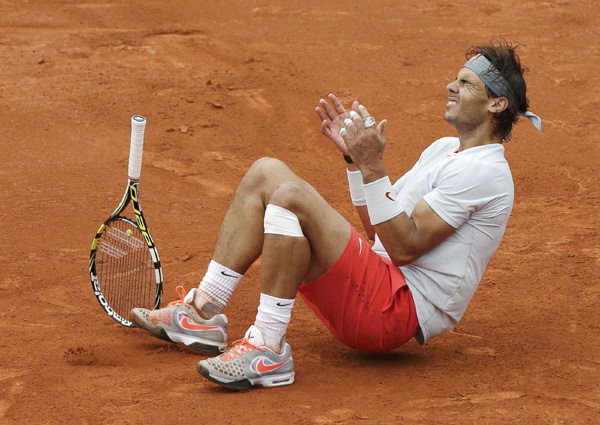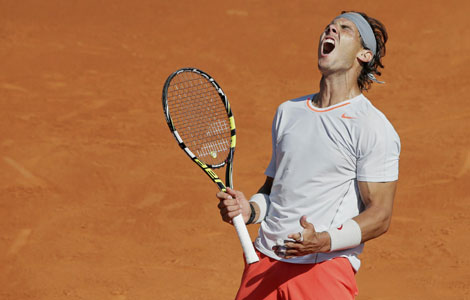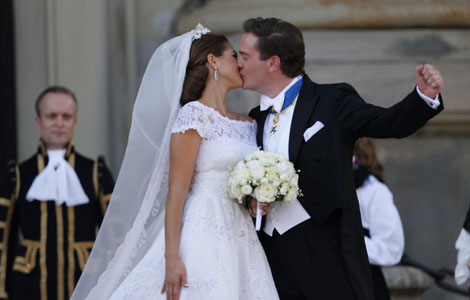
 |
|
Rafael Nadal of Spain celebrates defeating compatriot David Ferrer in their men's singles final match to win the French Open tennis tournament at the Roland Garros stadium in Paris June 9, 2013. Nadal won a record-extending eighth French Open title when he beat fellow Spaniard Ferrer 6-3 6-2 6-3 in Sunday's final. [Photo/Agencies] |
PARIS — If Rafael Nadal truly was going to be challenged, if his bid for an unprecedented eighth French Open championship would be slowed even a bit, this might have been the moment.
Leading by a set and a break 70 minutes into Sunday's final against David Ferrer, another generally indefatigable Spaniard, Nadal faced four break points in one game. The last was a 31-stroke exchange, the match's longest, capped when Nadal absorbed Ferrer's strong backhand approach and transformed it into a cross-court backhand passing shot.
Ferrer glared at the ball as it flew past and landed in a corner, then smiled ruefully. What else was there to do? Dealing with Nadal's defense-to-offense on red clay is a thankless task. His rain-soaked 6-3, 6-2, 6-3 victory over Ferrer was Nadal's record 59th win in 60 matches at the French Open and made him the only man with eight titles at any Grand Slam tournament.
"I never like to compare years, but it's true that this year means something very special for me," Nadal said, alluding to the way he managed to come back from a left knee injury that sidelined him for about seven months.
"When you have a period of time like I had," he added, "you realize that you don't know if you will have the chance to be back here with this trophy another time."
But he does it, year after year.
He won four French Opens in a row from 2005-08, and another four in a row from 2010-13.
"Rafael was better than me," said Ferrer, who had won all 18 sets he'd played the past two weeks to reach his first Grand Slam final at age 31. "He didn't make mistakes."
A week past his 27th birthday, Nadal now owns 12 major trophies in all — including two from Wimbledon, one each from the U.S. Open and Australian Open — to eclipse Bjorn Borg and Rod Laver and equal Roy Emerson for the third-most in history. Nadal trails only Roger Federer's 17 and Pete Sampras' 14.
"Winning 17 Grand Slam titles, that's miles away," Nadal said. "I'm not even thinking about it."
This was Nadal's first major tournament after a surprising second-round loss at Wimbledon last June. Since rejoining the tour in February, he is 43-2 with seven titles and two runner-up finishes. He's won his past 22 matches.
"For me, it's incredible," said Toni Nadal, Rafael's uncle and coach. "When I think of all that Rafael has done, I don't understand it."
No one, perhaps not even Ferrer himself, expected Nadal to lose Sunday.
That's because of Nadal's skill on clay, in general, and at Roland Garros, in particular, but also because of how Ferrer had fared against his friend and countryman — and video-game competitor — in the past.
Ferrer entered Sunday 4-19 against Nadal. On clay, Nadal had 16 consecutive victories over Ferrer, whose only head-to-head win on the surface came the first time they played, in July 2004, when Nadal was 18.
Nadal had yet to make his French Open debut then, missing it that year because of a broken left foot. On May 23, 2005, Nadal played his first match at Roland Garros, beating Lars Burgsmuller 6-1, 7-6 (4), 6-1 on Court 1, known as the "bullring" because of its oval shape.
And so began the reign.
Nadal won a record 31 consecutive matches at the French Open until the fourth round in 2009, when Robin Soderling beat him. In 2010, Nadal started a new streak, which currently stands at 28.
There was occasional shakiness this year. Nadal lost the first set of each of his first two matches and was pushed to a tiebreaker to begin his third.
He barely edged No. 1-ranked Novak Djokovic in a thrilling semifinal that lasted more than 4? hours and ended 9-7 in the fifth set Friday.
By any measure, that match was far more enjoyable to take in than the final, akin to dining on a filet mignon accompanied by a well-aged bottle of Bordeaux one day, then grabbing a hot dog and can of soda from a street vendor 48 hours later.
Under a leaden sky that eventually would release a steady shower from the second set on, Ferrer felt nerves at the outset, he acknowledged later. But after the players traded early breaks, Ferrer held for a 3-2 lead.
That's when Nadal took over, winning seven games in a row and 12 of 14. His court coverage was impeccable, as usual, showing no signs of any problems from that left knee, which was supported by a band of white tape. His lefty forehand whips were on-target, accounting for 19 of his 35 winners and repeatedly forcing errors from Ferrer.
When Nadal did have lapses, he admonished himself, once slapping his forehead with his right palm after pushing a lob wide. But what's demoralizing for opponents is the way Nadal slams the door when they have openings, then rushes through when he gets the slightest chance.
He was at his relentless best on key points, including those four break chances for Ferrer at 3-1 in the second set. Immediately after, Nadal broke to 5-1 on a forehand winner down the line.
As Nadal prepared to serve in the next game, a man wearing a white mask and carrying a fiery flare jumped out of the stands nearby. The intruder quickly was shoved to the ground by one security guard, while another went to protect Nadal.
"I felt a little bit scared at the first moment," Nadal said, "because I didn't see what's going on."
It happened within a few minutes of other actions by protesters, including chanting from the upper deck that briefly delayed play. Police said seven people were held for questioning.
Nadal got broken in that game, then broke back right away to take the second set.
The third set was similar to the first. It was 3-all, then suddenly over. Nadal took the last three games, ending the match with a forehand winner before dropping his racket and falling on his back, leaving a rust-colored smudge on his white shirt and flecks of clay on his stubbled cheeks. Soon he was standing, holding his index finger aloft.
Yes, Nadal is No. 1 at the French Open. When the ATP rankings are issued Monday, however, he will be No. 5, because of points he dropped while hurt.
Ferrer will be at No. 4.
"Yeah, it's strange, no? I lost the final against Rafael, but tomorrow I am going to be No. 4 and him No. 5," Ferrer said with a grin, then delivered his punch line: "I prefer to win here and to stay No. 5."
Sorry, David. This is Nadal's tournament.
Now the question becomes: Is eight enough?









